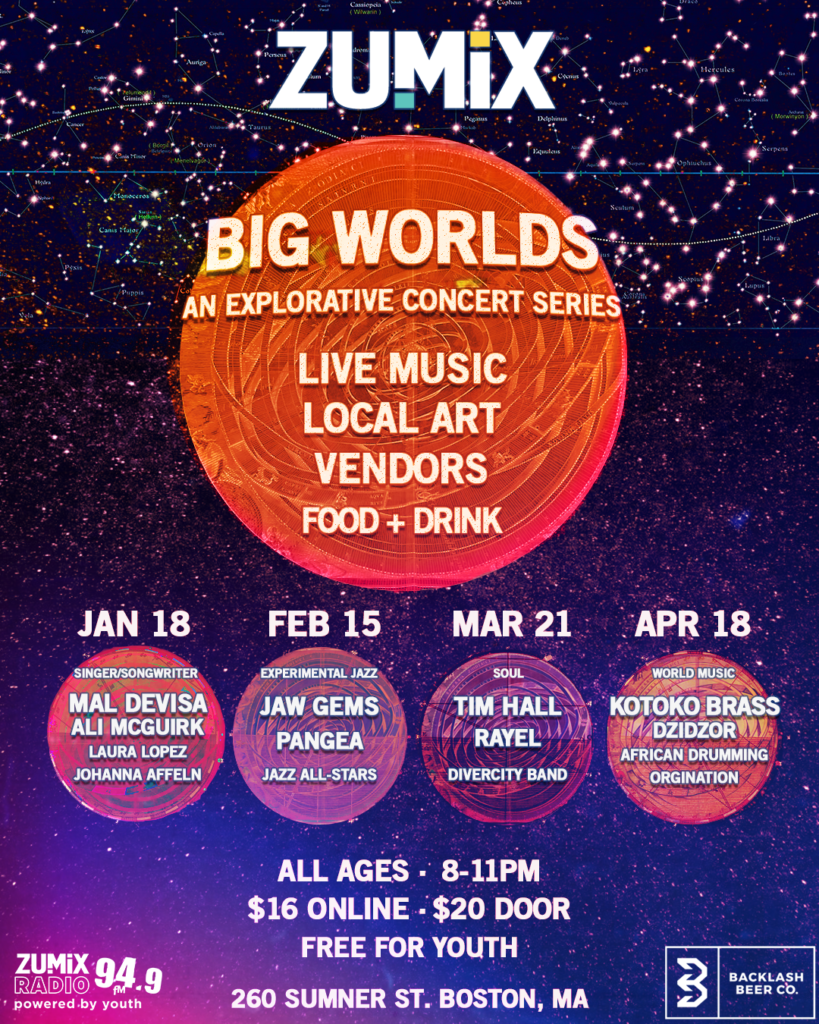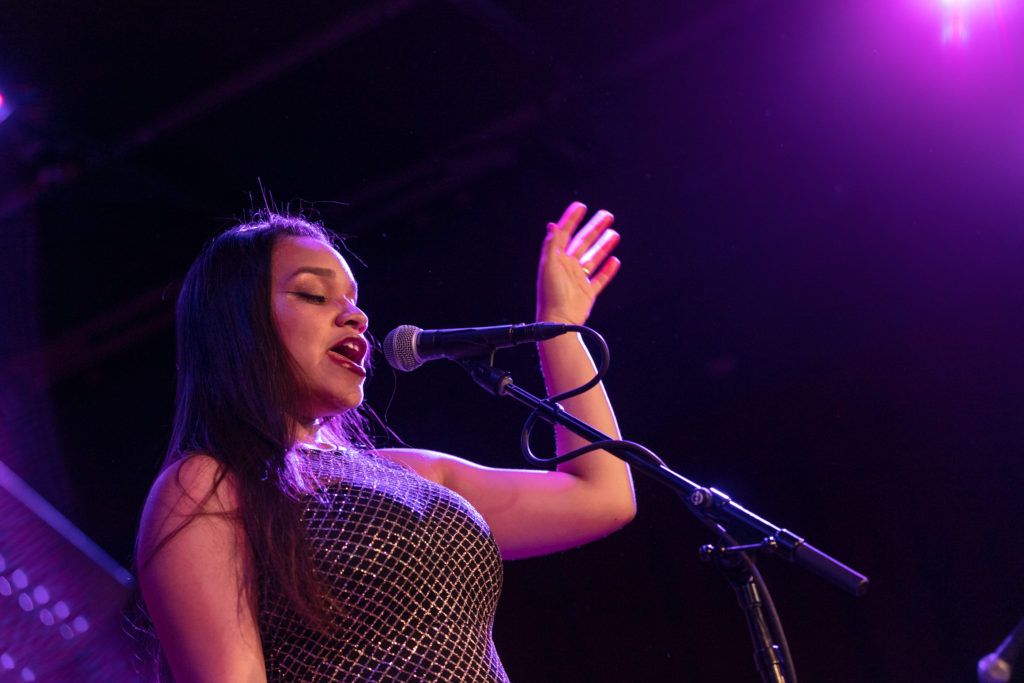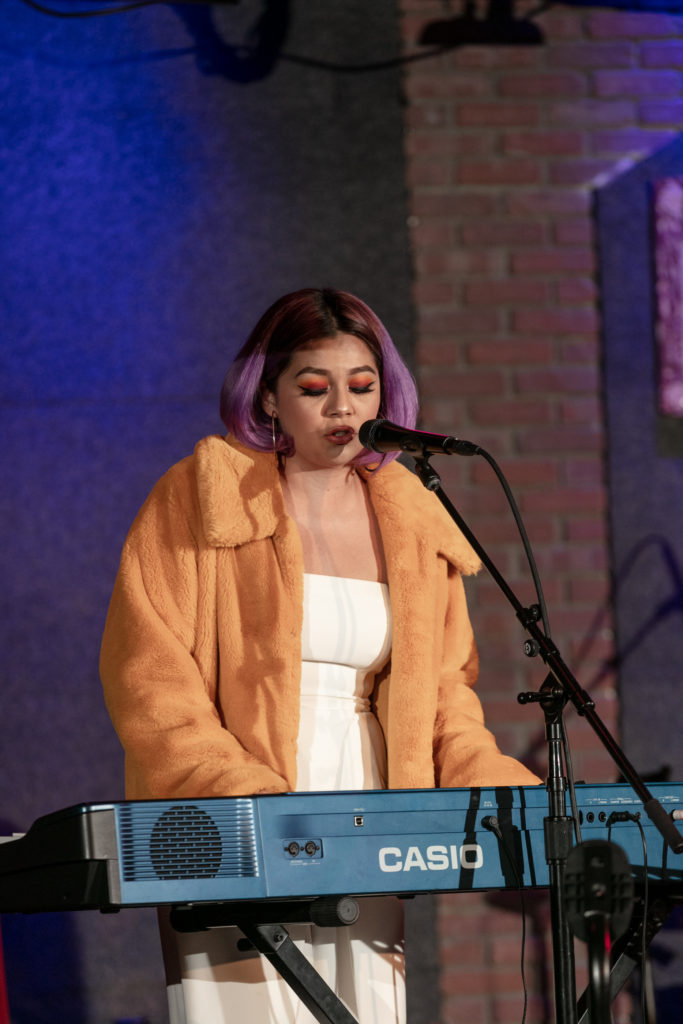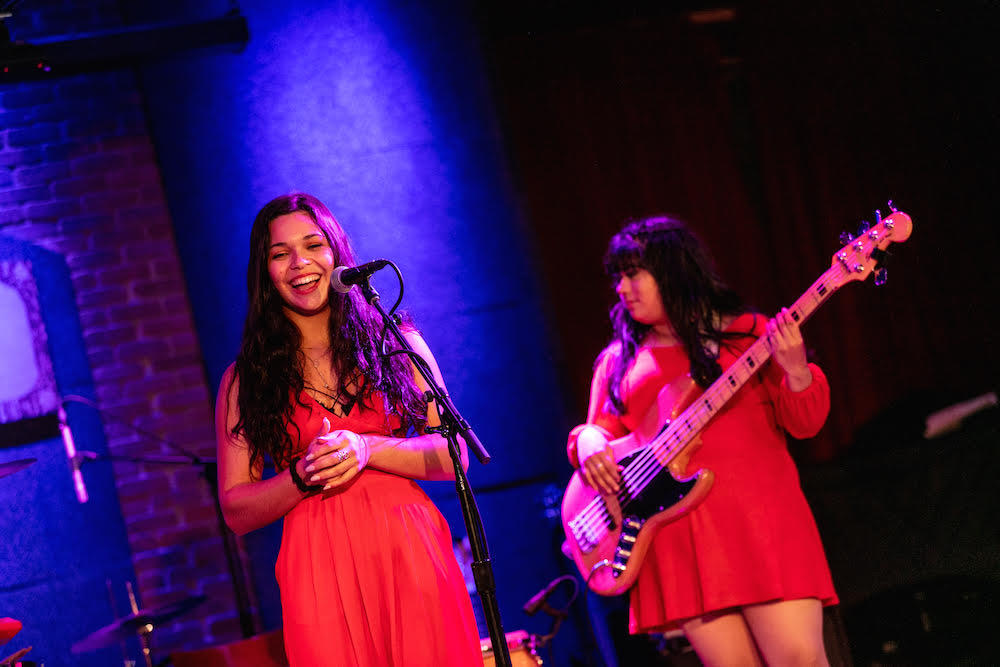
For the last 28 years, East Boston’s ZUMIX has established itself as a community leader in its mission to provide an enabling, engaging, and empowering environment for young people to express themselves through music. The non-profit organization offers classes in an array of areas: instrument lessons, opportunities to join a band, production and engineering education, journalism, radio, and much more.
Last year, ZUMIX launched its first season of Big Worlds, a concert series where each night focuses on a different genre and showcases talents from established local musicians, as well as giving the limelight to some of the talented students. For many of these students, these concerts serve as their first opportunity to perform their own music in front of an audience. In addition to the music, the events will feature the work of local artists, vendors, food, and drink.
To find out more about Big Worlds, we sat down with three of the ZUMIX students who are slated to perform: Laura Lopez-Finet, Johanna Affeln, and Thays Figuerido. Laura and Johanna will perform at the first Big Worlds event on January 18th, a night showcasing singer-songwriters; Thays, who sings as part of the ZUMIX Jazz Ensemble, will perform February 15th for the experimental jazz night. In typical Gen Z fashion, these teens were not quiet when expressing their opinions on the current state of the music industry, commercialism, and the illusion of fame.
_______________________________________________________
AP: Can you please introduce yourselves and tell me how you got involved with ZUMIX? What do you do with the organization?
Laura: My name is Laura. I’ve been a part of ZUMIX for four years. I’m a vocalist, and I also play piano, ukulele, and some guitar. My dad signed me up for ZUMIX and I’ve been a part of it since. It’s become my family. I’m here more than I’m at my house.
Johanna: My name is Johanna. I’ve been here for give or take eight years, so a long time. Since I was nine or ten. I had a private lesson with one of the teachers here, which got me into drums, piano, sing, play ukelele. I hope ZUMIX can keep up what it’s doing. It helps a lot of people, so I hope it can bring what it does here in East Boston into other communities.
Thays: I’m Thays. It’s been five years sinceI’ve been here. ZUMIX did a partnership with my middle school music class. I had heard about it and thought it sounded cool, but I was too cool for school so I wasn’t having it. Then in 7th grade, my teacher put me onto drums and singing. He pushed me to come here. I sing, play piano, some guitar. I just started getting into music production at school.

Thays Figuerido by Wayne Chinnock
AP: You’re each going to be involved in one of the upcoming Big Worlds shows that will be held here. Can you speak a little more about that involvement?
Thays: I’m doing it with the ZUMIX Jazz Ensemble [February 15th]. It’s me, two other young people, and the instructor is on drums. It’s going to be really fun and different. Usually, when I’ve performed, it’s been in a choir setting or just me and my music. It’s cool to be performing with a band in a genre that I dance to and mingle in, but I’m not super in-tune with [jazz]. It’s the roots of all modern music; R&B comes from jazz. Everyone incorporates pieces of it into their music. As an artist, it’s really important to familiarize yourself with it because it’s going to help you in the long run.
Johanna: I have the opportunity to play my own solo set with originals [on January 18th]. It’s going to be awesome! It will be the first time I’m presenting my music to an audience. I’m really excited about it; I’ll be able to put my own therapy sessions out there for people to listen to! [laughs] I’m excited to be able to express myself, see how people react and take to it. I’ll be mainly singing, but accompanying myself on ukulele and piano. I’ve been writing my own music since I was 13, so about five years.
Laura: I am also performing at the first Big Worlds. I’ve only really been writing music for about two years. A lot of my music is unfinished, but I am doing some of my more popular originals. I’m used to singing in a choir, with an ensemble; I’ve never really performed by myself, unless it’s been little gigs or for my family. I’m really nervous to perform, because I went to all the Big Worlds shows last year, and it felt like such a big deal! When I got the email to perform, I was like, “You want me? To do THAT?!?!” [laughter] I’m still really, really nervous, but I know everyone here believes in me, so I believe I can do it. I believe these beautiful women can do it, too.
AP: Congratulations to all of you! Who are some of your individual musical inspirations? Even if it’s not someone who influences your sound so much as a personality or attitude?
Thays: Personalities like Lady Gaga and Rihanna. They’re what I want to be as an artist because of their versatility. Lady Gaga’s first stuff was really pop, but she did a jazz album with Tony Bennett and then a country album. Same with Rihanna, how she moves onto different ventures: she’s a businesswoman, and she acts, and she dances. All this stuff. That’s what I want to do. I don’t want to stay stagnant when there are so many lanes to explore and potentially do well in.
Johanna: I really admire Nina Simone, how she did not allow herself to be categorized. She wasn’t just a jazz artist; she was able to infuse her classical music training with jazz and soul. I think it’s so beautiful. I want to be able to be versatile like that, to mix genres, and not be contained.
Laura: The two big artists who I look up to are P!nk ands Selena. My mom loves Selena, and even though I can’t really sing her songs because I don’t speak Spanish, I still relate to her music. The way she grew up – her dad was really into music but her mom was hesitant because it didn’t make enough money or she would get judged – I kind of relate to that. My family is like that, on and off with my music. They support me, but they’re not really sure if I can make a living out of it, I feel like I can. That’s what I’m working towards. P!nk, with her personality and music, she’s just fearless. She doesn’t write typical love songs. She always says, “you better treat me right or I will not love you. I will get my revenge.” I look up to that because of how people in this generation are treated. No one gets the respect they deserve. She’s a very strong person.
AP: Can you elaborate on not getting the respect you deserve?
Laura: A lot of people say, “Oh music is trash.” But it doesn’t matter which genre: music is everywhere! A lot of people don’t respect what other people want to do with their lives. You should. Everybody works to do something specific that makes them happy. I would rather do something that makes me happy for a living.
AP: Do you think some people are more into the end product – the musical result that people consume – without understanding that it’s part of a process and someone’s development as a person?
Laura: Yes. I feel like being a singer is different than being a vocalist or performer. Anyone can go to karaoke and sing. But being a performer, you have to know what the audience wants to see and to help them feel how the music is supposed to make them feel. To be a vocalist, you need to know all the background, the theory, the keys, all this important stuff that helps you be a better performer.
[The others snap in support.]
AP: Why do you think it’s important for people your age and younger to get involved not just in music but with an organization like ZUMIX, and to put themselves out there?
Laura: It releases stress. The end product always makes me feel good about myself. Especially here where you know everybody supports you. People completely understand. That’s why I decide to stay, no matter how much else I have going on. I go to a performing arts school and take a masterclass at Berklee. It’s weird, because at each different place, I’m held to a different standard. It gets stressful. I’m sure [Thays and Johanna] can relate.
Thays: I think being involved in a place like this – to be involved in art and a non-profit – you learn how to assert yourself, and to put yourself in places of vulnerability that help you grow as a person. Extracurriculars help you learn from other people. They push to know you in a different way than at home or at school. You need other people with shared interests to learn about yourself.

Laura Lopez by Wayne Chinnock
AP: Do you find a kinship being surrounded with other people who are all working at honing their own music?
Thays: It definitely helps having people like Johanna and Laura. We all say things through music that we can’t really communicate properly through regular speaking. It gives you warm feelings in your heart. Butterflies in your stomach. When you have someone who understands you, who truly gets you. Your parents support you, but sometimes they don’t understand you. It’s important to talk to other artists.
Johanna: Music – at least for me – is for when words don’t do my emotions justice. It’s very therapeutic to me. I can use it to let go of a lot of things that I couldn’t express to my family or even friends. Self-reflection can be very scary, but music allows you to open up in a safe space. You can always find a song – whether you write it yourself or you’re listening to a different artist – you can always find something to relate to. That is so important for people, especially now with social media. It’s supposed to connect you, but you can also feel so incredibly alone. You can find this connection through music. It’s a tool. You find a lot of great music in times of revolution or pain. Like with Nina Simone and the Civil Rights movement.
AP: That’s a really good point. There’s a consumer side to music – especially tied to social media – and sometimes it feels like there’s so much pressure to experience everything and for all of that to be “new.” Do you think it’s become harder to make a lasting, powerful message that speaks to the time?
Thays: I think it has to do with the way technology has placed itself in society. You can see a thousand things all at once. It’s made a connection across the globe, but that means that – for example, the bushfires in Australia, and potentially a World War – there are so many things happening at once. There are so many things thrown at us. It’s overwhelming and it desensitizes us. I was born in 2003; I’ve seen so many terror attacks in my life, so many instances in disaster. It’s become just a regular occurence. That happens in a smaller, less drastic form in music. Everyday, there’s a new artist coming out. There’s a new “Lil Something.” There’s nothing new in music, really.
Johanna: There are only so many chords and progressions.
Thays: There’s only so much you can do! Music has been around forever; before pencil and paper, before recordings. Even when someone says they came up with something new. Now, copyright is becoming such a big thing. But that’s the way music works; you’re constantly recycling, but adapting what you’ve heard in an unfamiliar way. There have always been songs about heartache, about loss, about love and happiness. How many ways can you describe this thing? How many sounds? How many words to describe the same thing that you’ve heard millions of times?
Laura: That’s why I’m afraid if I ever get big! Someone might decide to [sue me]. Everybody is influenced by someone else, so whatever comes to your mind is influenced [by people who came before]. You just have to put down what you want and feel. At this point, everything has been made. You can still put something in your own words, but someone’s already said it. Nothing is really original; everything comes from something else. A lot of people need to start being open-minded about music. They’re still making money. Are you really an artist to be an artist or to make money? This is why I don’t want to be famous; I just want to be successful with my music. I just want people to relate to it, even if I just do little café shows. If people want to like my music, they’re going to like it the way I make it.

Johanna Affeln by Duncan O’Boyle
AP: I’m going to snap to that!
Johanna: If consumerism were used in a [more] constructive way, that’s a great way to spread a message. Someone like Taylor Swift urged her fans to vote, which is great, but I think her music is made to appeal to a lot of people. But I think there are so many more artists with important things to say. Everyone’s music is valid, but some people who might not have the money to reach people like that [don’t get that platform]. It’s sad that these voices aren’t heard.
Thays: A lot of people who are successful get so consumed by this consumerism that they end up dying. Artists like Amy Winehouse or Kurt Cobain. It can become a very destructive thing really, really fast. People don’t really care how they feel; they just want “Smells Like Teen Spirit.” Do I need to be this top-selling artist, or do I get to do what I love? Not to keep bashing Taylor Swift, but her current album and the previous one was like, “Oh my God, I’m so sad because Kim Kardashian was mean to me on Twitter.” But girl! There’s literally people dying! It’s just for her public image. There’s this huge hypocrisy in the music industry where people will say, “I’m an activist,” but they’re making [hundreds of millions of] dollars a year. You make these big public statements, but aren’t really doing anything. They’re just enabling this consumerism.
Johanna: When you are in such a powerful position, what you do and say can have a huge impact.
Laura: Even just with people I know, there are people who think that just because they have an amazing voice or a few followers that they’re the best. I know people who come out with music, everyone hypes it up, but it’s just not good! That they didn’t put any thought into it.
AP: Do you think they aren’t being challenged? Or that they surround themselves with people who aren’t honest with them?
Laura: Yes! At school, there are a lot of people who were the best singers in their middle schools, but then they come to a performing arts high school, and suddenly it’s like, whoa! I’m not the only one anymore. A lot of those people didn’t get any criticism. To be a good artist, you need that. Criticism, but not hate. We all put a lot of work into our music.
AP: Not every talented, young artist is given the same opportunity as a Justin Bieber or Selena Gomez for example, who were given incredible routes to success at such early ages. How do you feel about the pressure of being young, wanting to make music, but being held to the standard of commercial success as some of these massive artists?
Johanna: It’s so hard and depressing to see someone like Billie Eilish – no disrespect! – and I’m turning 18, thinking, well I’m not up there. And some people don’t even know what they want to do after high school. Can you imagine at 14 having to decide – even if this is your passion for the moment – having to do that for the rest of your life and not having a way out? There’s a lot of pressure to be very good at a very young age. It breeds this hostile environment of the need to compete and do anything for fame. It makes people do things for the sake of standing out that they wouldn’t normally do. You just don’t have the time to figure out what you really want to do or who you are.
Thays: It’s this immense pressure that no one puts on you but yourself. But it feels like that’s what’s being thrown at you all the time.
